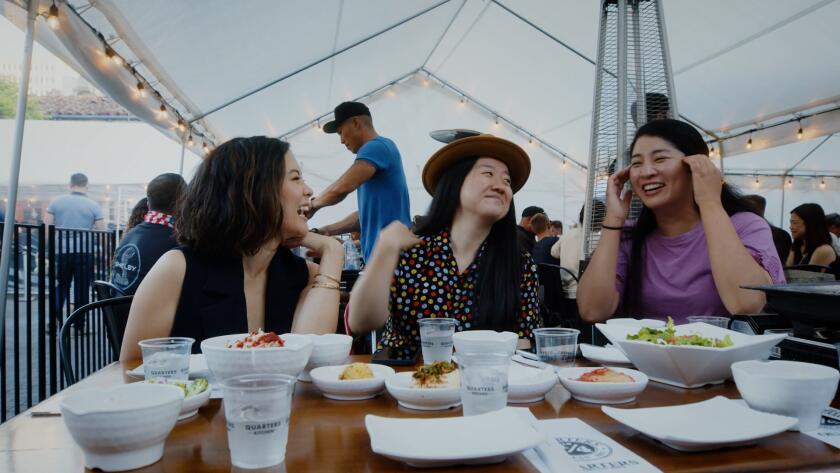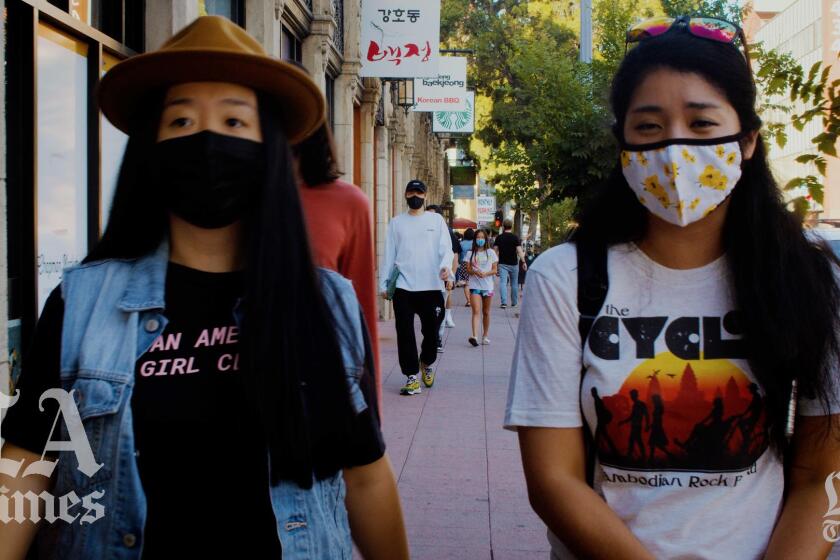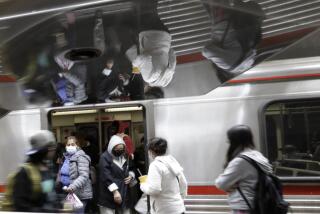Is sharing food at Korean barbecue safe? Navigating L.A.’s reopening with ‘Good Trouble’s’ Sherry Cola
- Share via
Outdoor dining has been busy for months in Los Angeles, but if you haven’t been back to a Korean barbecue yet, you may be wondering about communal dining. The L.A. Times went to dinner with an infectious disease expert and “Good Trouble’s” Sherry Cola to find out what it’s like.
- Share via
L.A.’s restaurants have been on the rebound since mid-May, when the county entered the state’s yellow tier and restaurants were able to not only operate outside but also fill indoor spaces to 50% capacity.
When the state fully opened June 15, restaurants were able to return at 100% capacity and do away with social distancing requirements between tables and patrons.
Employees are still required to adhere to social distancing guidelines and wear masks. Unvaccinated people are still required to wear masks, though it’s up to the restaurant whether to ask for proof of vaccination, require everyone to wear a mask or use an honor system.
So when different establishments can make different rules based on their own comfort levels, how do we make our own personal decisions about risk?
To better understand any risks associated with a meal at a Korean barbecue restaurant, we took actress and comedian Sherry Cola (“Good Trouble”) and Cedars-Sinai Medical Center infectious disease physician Catherine Le to Quarters Korean BBQ for dinner before California’s regulations were relaxed June 15.
Emily Oster, a Brown University economist who’s been studying COVID-19 risk, explained that the risk during the height of the pandemic is entirely different from the risk in L.A. now, when the COVID-19 rates are close to where they were in February 2020 and vaccination rates are high.
Numbers, variants and vaccines
“So I think in all of these things, a good overarching framework is that you can rank things by safety, but if everyone in your party is vaccinated, all of these things are extremely safe,” Oster said.
“So outdoor dining safer than indoor dining, but both are safe if everyone is vaccinated. Sitting far away from people is safer than sitting close to people, but both are safe if everyone is vaccinated. Sharing food with people you’re with is probably less safe than not sharing food, but both are safe if everyone is vaccinated.”
Le, who heads Cedars’ COVID-19 Recovery Program and wrote a children’s book called “Coronavirus Is Boo Boo,” said many of the changes that we made in our behavior may not be necessary anymore, but will probably be more helpful for hygiene generally.
She feels comfortable sharing food if she knows the people and their vaccination statuses.
“Especially with an Asian community, food is such a communal thing,” she said. “Everything is family-style.”
You can always use the other end of the chopsticks to pick up communal food or have separate serving utensils.
We consulted experts before going to Koreatown with actress and comedian Sherry Cola of “Good Trouble.” We learned about how to make decisions and mitigate risk of coronavirus and other germs while going to a spa, a Korean barbecue restaurant and karaoke with friends.
Buffets, on the other hand, take food sharing to another level. The risk is higher when you’re sharing food with strangers.
But if cases are low in your area, it’s still relatively low risk.
“Buffets are a high-germ environment,” Le said. “Not for COVID, but for other things.”
Things to keep in mind in a reopened California
More to Read
Sign up for Essential California
The most important California stories and recommendations in your inbox every morning.
You may occasionally receive promotional content from the Los Angeles Times.













